

Sir Ken Robinson: 10 talks on education. Sir Ken Robinson On The Role Of Policy In Education. Ueberflow. Why School? TED ebook author rethinks education when information is everywhere. The Internet has delivered an explosion of learning opportunities for today’s students, creating an abundance of information, knowledge, and teachers as well as a starkly different landscape from the one in which our ideas about school were born.
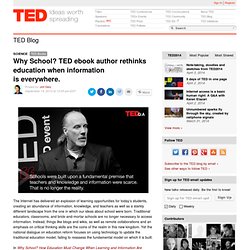
Traditional educators, classrooms, and brick-and-mortar schools are no longer necessary to access information. Instead, things like blogs and wikis, as well as remote collaborations and an emphasis on critical thinking skills are the coins of the realm in this new kingdom. Yet the national dialogue on education reform focuses on using technology to update the traditional education model, failing to reassess the fundamental model on which it is built.
In Why School? How Education Must Change When Learning and Information Are Everywhere, educator, parent and blogger Will Richardson challenges traditional thinking about education— questioning whether it still holds value in its current form. Why must schools change how they teach? Tablets statt Schulbücher: Verlage skeptisch. In der zweiten Klasse der Hauptschule Jennersdorf im Burgenland gibt es keinen gedruckten Schulatlas mehr.
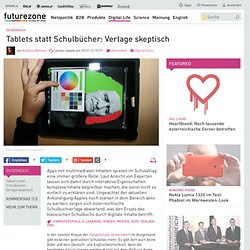
Es gibt dort auch keine Bibel und kein Deutsch- und Englischwörterbuch, denn die benötigten Informationen werden digital mit dem iPad von Apple abgerufen. "Beim digitalen Wörterbuch bekommen die Kinder das Wort `beautiful` von einem Native Speaker vorgelesen und hören dadurch sofort, wie das Wort richtig ausgesprochen wird", erklärt Direktor Hannes Thomas die Vorteile. In Geografie setzt man auf Google Maps und auf zusätzliche Apps, mit denen man beispielsweise Erdbeben interaktiv simulieren kann. "Das kann mir ein Buch nicht bieten", so der Tablet-Verfechter, der in den Touch-Geräten die Zukunft des Lernens sieht, zur futurezone.
Ähnlich überzeugt gibt sich auch die Klassenlehrerin der iPad-Klasse in der Volksschule Breitenlee, Barbara Zuliani. Is Sweden's Classroom-Free School the Future of Learning? - Education. The traditional setup of school classrooms—straight rows of desks with accompanying chairs—doesn't do much to foster creativity or collaboration.
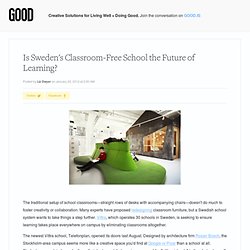
Many experts have proposed redesigning classroom furniture, but a Swedish school system wants to take things a step further. Vittra, which operates 30 schools in Sweden, is seeking to ensure learning takes place everywhere on campus by eliminating classrooms altogether. The newest Vittra school, Telefonplan, opened its doors last August. Designed by architecture firm Rosan Bosch, the Stockholm-area campus seems more like a creative space you'd find at Google or Pixar than a school at all.
Students can work independently on their laptops while lounging on one of the "sitting islands" in the photo above. Jannie Jeppesen, the principal of Vittra Telefonplan writes on the school's website that the design is intended to stimulate "children's curiosity and creativity" and offer them opportunities for both collaborative and independent time. C. M. Rubin: The Global Search for Education: More Arts Please. More Arts Please Sir (Photo Courtesy of Beechwood Sacred Heart School UK) "To lose our culture is to lose our memory.
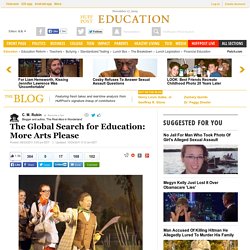
" More Leonardo da Vincis, more Martha Grahams, more Ludwig Van Beethovens, more Luciano Pavarottis, more Marlon Brandos, more Antoni Gaudis, more Coco Chanels, more Bob Dylans, more Zhang Xiaogangs, more William Shakespeares, more Julia Margaret Camerons, more Gustav Vigelands, more Andrew Lloyd Webbers, more Francis Ford Coppolas, more Meryl Streeps, more Alice In Wonderlands, more Anna Pavlovas, more Michael Jacksons, more Vincent van Goghs, more Harry Potters, more Phil Knights, more Rabindranath Tagores, more Pablo Picassos, more John Steinbecks... Please Sir - can we have some more? Sir Ken Robinson, PhD, is one of the internationally recognized leaders in the development of education creativity and innovation.
He has received numerous honorary degrees from universities, and many awards from cultural organizations and governments, all over the world. AskSKR Question 2: Assessing Creativity « Sir Ken Robinson.com. AskSKR Intro and Question #1 « Sir Ken Robinson.com. Welcome to Sir Ken Robinson's Website. Sir Ken Robinson: Bring on the learning revolution! Ken Robinson says schools kill creativity. Schools as Innovative Spaces. Sir Ken Robinson: Bring on the learning revolution! Where hands-up in class is banned. 8 September 2010Last updated at 00:33 By Megan Lane BBC News Magazine No more raised hands to answer questions, and a short, sharp burst of PE first thing every day.
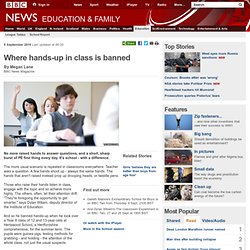
It's school - with a difference. The more usual scenario is repeated in classrooms everywhere. Teacher asks a question. A few hands shoot up - always the same hands. Those who raise their hands listen in class, engage with the topic and so achieve more highly. And so he banned hands-up when he took over a Year 8 class of 12 and 13-year-olds at Hertswood School, a Hertfordshire comprehensive, for the summer term. Boys in particular can lag behind, so in another experiment for the BBC, choirmaster Gareth Malone turned teacher for a term at Pear Tree Mead Primary in Essex, to try to re-engage boys who don't like school. So what did they do - and why? Slates - in hi-tech form - worked well "When teachers ask questions, it's always the same few pupils who put up their hands.
"It's the return of the slate. This proved unpopular. A.